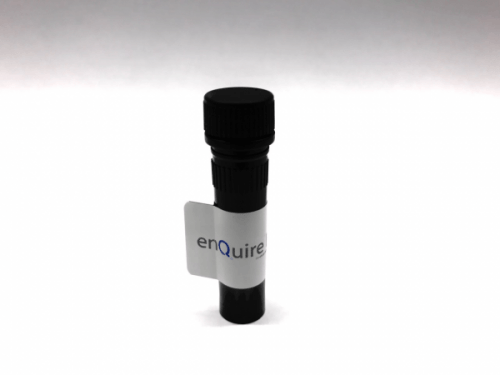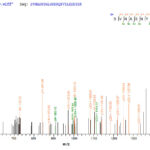Mouse FAP / Seprase Recombinant Protein Product Attributes
Product Type: Recombinant Protein
Recombinant FAP / Seprase based upon sequence from Mouse
Host: QP9976 protein expressed in Invitro-E.coli.
Tag: His-SUMO
Protein Construction: A DNA sequence encoding the Mus musculus (Mouse) FAP / Seprase, was expressed in the hosts and tags indicated. Please select your host/tag option, above.
Recommended Applications: Immunogen, Protein Standard, Cell culture, or Other Cell Biology Applications.
Application Notes: Please contact us for application specific information for QP9976.
Bioactivity Data: Untested
Full Length? Extracellular Domain
Expression Region: Leu26 – Asp761
Amino Acid Sequence: LRPSRVYKPE GNTKRALTLK DILNGTFSYK TYFPNWISEQ EYLHQSEDDN IVFYNIETRE SYIILSNSTM KSVNATDYGL SPDRQFVYLE SDYSKLWRYS YTATYYIYDL QNGEFVRGYE LPRPIQYLCW SPVGSKLAYV YQNNIYLKQR PGDPPFQITY TGRENRIFNG IPDWVYEEEM LATKYALWWS PDGKFLAYVE FNDSDIPIIA YSYYGDGQYP RTINIPYPKA GAKNPVVRVF IVDTTYPHHV GPMEVPVPEM IASSDYYFSW LTWVSSERVC LQWLKRVQNV SVLSICDFRE DWHAWECPKN QEHVEESRTG WAGGFFVSTP AFSQDATSYY KIFSDKDGYK HIHYIKDTVE NAIQITSGKW EAIYIFRVTQ DSLFYSSNEF EGYPGRRNIY RISIGNSPPS KKCVTCHLRK ERCQYYTASF SYKAKYYALV CYGPGLPIST LHDGRTDQEI QVLEENKELE NSLRNIQLPK VEIKKLKDGG LTFWYKMILP PQFDRSKKYP LLIQVYGGPC SQSVKSVFAV NWITYLASKE GIVIALVDGR GTAFQGDKFL HAVYRKLGVY EVEDQLTAVR KFIEMGFIDE ERIAIWGWSY GGYVSSLALA SGTGLFKCGI AVAPVSSWEY YASIYSERFM GLPTKDDNLE HYKNSTVMAR AEYFRNVDYL LIHGTADDNV HFQNSAQIAK ALVNAQVDFQ AMWYSDQNHG ISSGRSQNHL YTHMTHFLKQ CFSLSD
Purity: Greater than 85% as determined by SDS-PAGE.
Reconstitution Instructions: Concentrated protein in liquid format. Reconstitution is not necessary.
Concentration of Mouse FAP / Seprase Protein:
Endotoxin Levels: Not determined.
Buffer: Tris-based buffer, 50% glycerol
Storage Conditions: Store at -20C to -80C.
| Recombinant Mouse FAP / Seprase Protein General Information | |
|---|---|
| Curated Database and Bioinformatic Data | |
| Gene Symbol | FAP |
| Entrez Gene ID | 14089 |
| Ensemble Gene ID | ENSMUSG00000000392 |
| RefSeq Protein Accession(s) | NP_032012.1 |
| RefSeq mRNA Accession(s) | NM_007986.3, XM_006498746.3 |
| UniProt ID(s) | P97321 |
| UniGene ID(s) | Mm.41816 |
| COSMIC ID Link(s) | FAP |
| KEGG Gene ID(s) | mmu:14089 |
| General Description of Recombinant Mouse FAP / Seprase Protein. | |
| Cell surface glycoprotein serine protease that participates in extracellular matrix degradation and involved in many cellular processes including tissue remodeling, fibrosis, wound healing, inflammation and tumor growth. Both plasma membrane and soluble forms exhibit post-proline cleaving endopeptidase activity, with a marked preference for Ala/Ser-Gly-Pro-Ser/Asn/Ala consensus sequences, on substrate such as alpha-2-antiplasmin SERPINF2 and SPRY2. Degrade also gelatin, heat-denatured type I collagen, but not native collagen type I and IV, vibronectin, tenascin, laminin, fibronectin, fibrin or casein. Have also dipeptidyl peptidase activity, exhibiting the ability to hydrolyze the prolyl bond two residues from the N-terminus of synthetic dipeptide substrates provided that the penultimate residue is proline, with a preference for Ala-Pro, Ile-Pro, Gly-Pro, Arg-Pro and Pro-Pro. Natural neuropeptide hormones for dipeptidyl peptidase are the neuropeptide Y (NPY), peptide YY (PYY), substance P (TAC1) and brain natriuretic peptide 32 (NPPB). The plasma membrane form, in association with either DPP4, PLAUR or integrins, is involved in the pericellular proteolysis of the extracellular matrix (ECM), and hence promotes cell adhesion, migration and invasion through the ECM. Plays a role in tissue remodeling during development and wound healing. Participates in the cell invasiveness towards the ECM in malignant melanoma cancers. Enhances tumor growth progression by increasing angiogenesis, collagen fiber degradation and apoptosis and by reducing antitumor response of the immune system. Promotes glioma cell invasion through the brain parenchyma by degrading the proteoglycan brevican. Acts as a tumor suppressor in melanocytic cells through regulation of cell proliferation and survival in a serine protease activity-independent manner | |
Limitations and Performance Guarantee
This is a life science research product (for Research Use Only). This product is guaranteed to work for a period of two years when stored at -70C or colder, and one year when aliquoted and stored at -20C.





There are no reviews yet.